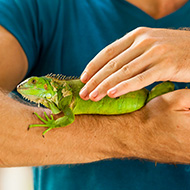Reptile relinquishment could be halved with education

"I believe that education is a key aspect of protecting wider reptile welfare" - Helen Tedds.
Better education on reptile care and welfare could almost halve the number of pet reptiles being given up, new research from Hartpury University suggests.
Lecturer in Animal Welfare and academic Helen Tedds is currently undertaking research on the pet reptile trade across England, and has analysed tens of thousands of classified adverts selling reptiles in order to gain an understanding of the reasons that owners give up a pet.
Of the 20,908 reptiles advertised with a reason for sale or rehoming over the last three years, 44.6 per cent cited reasons that Tedds believes could potentially have been avoided by better education on the species.
Discussing her research, Helen said: “Reptiles, like so many other pets, can be extremely rewarding for their owners. However, they often have specialist needs when it comes to things like housing, nutrition, and enrichment.
“Rehoming reptiles can be unsettling for the animal and is often upsetting for the owner, who with the right guidance and support, may feel more confident and empowered to keep the pet and provide a good home.”
Owing to her research, Tedds has been invited to the House of Lords to discuss the launch of the new 'Pet Know How' initiative, created by the Companion Animal Sector Council.
The initiative aims to educate prospective reptile owners before they buy, allowing for greater care and welfare.
Helen commented: “Given the findings from my research, I believe that education is a key aspect of protecting wider reptile welfare and I’m very much in support of this new initiative from the Companion Animal Sector Council.”



 The RCVS has announced a new version of its 1CPD mobile app, with enhanced features for veterinary surgeons and veterinary nurses to record their continuing professional development.
The RCVS has announced a new version of its 1CPD mobile app, with enhanced features for veterinary surgeons and veterinary nurses to record their continuing professional development.